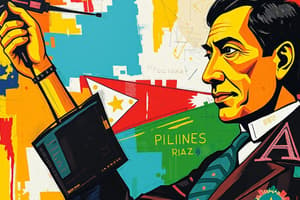Podcast
Questions and Answers
What Tagalog poem did Rizal write at the age of eight?
What Tagalog poem did Rizal write at the age of eight?
- A patriotic poem about the Philippines (correct)
- A religious poem
- A humorous poem
- A poem about nature
In which city did Rizal pursue higher education and broaden his perspectives?
In which city did Rizal pursue higher education and broaden his perspectives?
- Madrid (correct)
- London
- Rome
- Paris
What were the titles of José Rizal's notable novels that criticized Spanish rule in the Philippines?
What were the titles of José Rizal's notable novels that criticized Spanish rule in the Philippines?
- The Fight for Independence and The Liberation Movement
- Noli me tangere and El filibusterismo (correct)
- The Awakening and The Revolution
- The Patriot and The Freedom Fighter
What family member taught Rizal the alphabet at the age of three?
What family member taught Rizal the alphabet at the age of three?
What was José Rizal known for in addition to being a patriot and physician?
What was José Rizal known for in addition to being a patriot and physician?
What was José Rizal's primary commitment during his exile in Dapitan?
What was José Rizal's primary commitment during his exile in Dapitan?
How did Rizal's views on reform impact his fate in 1896?
How did Rizal's views on reform impact his fate in 1896?
Why are José Rizal's life and works still studied in college education?
Why are José Rizal's life and works still studied in college education?
What aspect of Filipino history do José Rizal's writings shed light on?
What aspect of Filipino history do José Rizal's writings shed light on?
What makes José Rizal a revered national hero in the Philippines?
What makes José Rizal a revered national hero in the Philippines?
Flashcards are hidden until you start studying
Study Notes
José Rizal: A Pivotal Figure in Philippine History
José Rizal, born on June 19, 1861, in Calamba, Philippines, was a patriot, physician, and man of letters who played a crucial role in the Philippine nationalist movement. His life and works continue to be relevant in modern-day education, providing insights into the country's history, culture, and contemporary issues.
Early Life and Education
Rizal was the seventh child in a prosperous family with 11 children, including two boys and nine girls. His father, Francisco Mercado Rizal, was an industrious farmer, and his mother, Teodora Alonzo y Quintos, was a highly cultured and accomplished woman. Rizal's education began at a young age, with his mother teaching him the alphabet at the age of three. He displayed artistic abilities, creating pencil drawings and sketches, and wrote a Tagalog poem at age eight.
Rizal pursued higher education in Madrid, where he expanded his academic horizons and immersed himself in European culture and philosophy. His experiences in Madrid broadened his perspectives, and he became increasingly involved in the reform movement, collaborating with fellow Filipinos seeking political change and equal rights for their people.
Writing and Political Activism
Rizal's works, such as his novels "Noli me tangere" (1887) and "El filibusterismo" (1891), were passionate expositions of the evils of Spanish rule in the Philippines. He also founded a school in Talisay during his four-year exile in Dapitan, highlighting his commitment to education and community development. Despite advocating for reform rather than independence, Rizal was eventually arrested and executed by firing squad in Manila on December 30, 1896, after the Katipunan, a Filipino nationalist secret society, revolted against Spain.
Legacy and Relevance
Rizal's life and works continue to be studied in college education because they offer valuable perspectives on civic education, student motivation, and personal relationships in the college experience. His emphasis on the importance of personal relationships and his contributions to student motivation can inspire current and future generations of Filipino college students.
Moreover, Rizal's writings provide insights into Philippine history, culture, and nationalism, shedding light on the challenges faced by the Filipino people during Spanish colonial rule. His influence on Philippine history and the ongoing struggle for freedom makes him a revered national hero in the Philippines.
Conclusion
José Rizal, born on June 19, 1861, in Calamba, Philippines, was a multifaceted intellectual and political activist who played a pivotal role in the Philippine nationalist movement. His life and works are still relevant in modern-day education, offering valuable insights into the country's history, culture, and contemporary issues. His enduring impact on Philippine history and his fight for justice, liberty, and patriotism continue to inspire the country and its people.
Studying That Suits You
Use AI to generate personalized quizzes and flashcards to suit your learning preferences.




